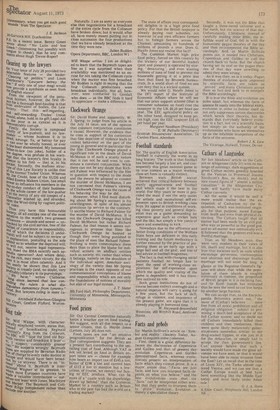Food prices
Sir: Our Central Committee naturally keeps a weather eye on food trading. We suggest, with all due respect to a senior citizen, that G. Haydn Jones (Letters, July 28) does not.
Food taxes are not ” an emotive prognostication " for the British as that correspondent suggests. They are a present fact contributing to the spiralling cost of food. Although VAT is not yet levied on food in Britain import taxes are — cheese for example now bears an import tax of £245.a ton, butter of E198 a ton and canned ham of E115 a ton to mention but a few: unless, of course, we restrict our buying to EEC produce. What can be more of a ' castle with the drawbridge drawn up behind than the Common Market to a country such as Britain who in the past has had the world as a. trading market? The state of affairs your correspondent delights in is a high price food policy. For that the British taxpayer is already paying vast subsidies, not however to our own efficient farmers but to foreign farmers across the Channel, amounting to hundreds of millions of pounds a year. Does G. HaYdn Jones not realise this fact?
The Common Market high price food policy, forced on this country by the trickery of our deceitful leaders (past and present) is operated by storing, ' denaturing ', and even wasting millions of tons of food to prevent the housewife getting it at a price less than that fixed by Brussels bureaucrats. In a world short of food no one can deny that is a wicked system. We would refer G. Hayd.n Jones to the 1971 report of the Institute of Economic Affairs where he will see that our price support scheme (that is consumer subsidies on food) cost the taxpayer in the UK £6.29 per head per year. The EEC agricultural policy on the other hand, designed to keep prices high, cost the EEC taxpayer £16.45 per head per year. Margaret Needham (President) E. M. Pattullo(Secretary) Scottish Housewives' Association, 14 Carden Place, Aberdeen


































 Previous page
Previous page